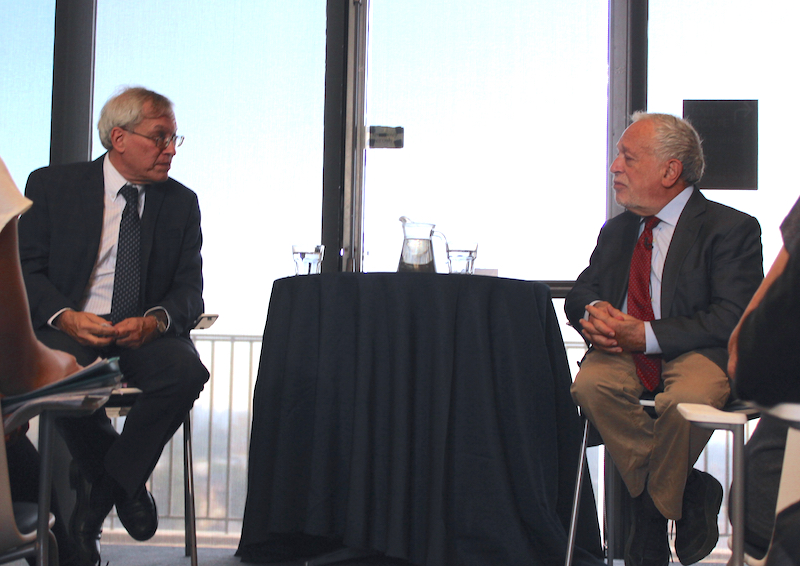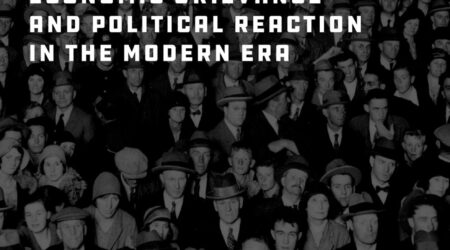Will Congress vote to impeach President Trump? What would his legal defense look like? If not impeachment, how else might this process play out?
These questions were at the heart of a recent “Matrix On Point” panel discussion featuring two prominent scholars: Erwin Chemerinsky, Dean of the School of Law and an expert in constitutional law, criminal procedure, and federal jurisdiction, and Robert B. Reich, Carmel P. Friesen Professor of Public Policy at the Goldman School of Public Policy, who has served in three national administrations, including as Secretary of Labor under President Bill Clinton. Over the course of 80 minutes, the two men engaged with audience members in discussion about an array of factors that could shape the prospects for President Trump’s impeachment. The event was co-sponsored by the Goldman School of Public Policy.
Following an introduction by Michael Watts, Interim Director of Social Science Matrix and Emeritus “Class of 1963” Professor of Geography and Development Studies, Dean Chemerinsky kicked off the discussion with an overview of what the constitution says (and does not say) in regard to impeachment. He cited the historic examples of Andrew Johnson, Richard Nixon, and Bill Clinton, and noted that in addition to being removed through impeachment, a president can choose to resign, as Nixon did, or both houses of Congress can choose to censure a president, as happened to Andrew Johnson.
 “There may be more talk about censure of Trump if there is a desire in both houses to do something,” Chemerinsky said. “There are no legal consequences to a censure; it’s an expression of displeasure toward the president.”
“There may be more talk about censure of Trump if there is a desire in both houses to do something,” Chemerinsky said. “There are no legal consequences to a censure; it’s an expression of displeasure toward the president.”
He noted that the Constitution says the President can be removed “for treason, bribery, and other high crimes and misdimeanaors,” and that last phrase could become prominent in the coming weeks and months. “The real focus is, what does it mean to say, ‘other high crimes and misdemeanors?’” Chemerinsky said. “A criminal violation is neither necessary nor sufficient for it to be a high crime and misdeameanor.”
Chemerinsky noted that, in the case of Trump’s statements, “there’s not a disupute over what was said: Trump said, ‘I need a favor,’ and none other than Mick Mulvaney said, ‘it was a quid pro quo, get over it’…. The fact-finding won’t be a important as it was with Nixon. It’s, is this a high crime and misdemeanor? And it will come to those who say, this is a serious abuse of power…and others will say, this is what presidents do, and it doesn’t rise to a high crime and misdemeanor.”
Chemerinsky also wondered whether the president’s violations of the emoluments clause will come into play. “Until January 2017, most people thought emoluments were just a skin cream,” he quipped. He commented that, because the Constitution “doesn’t say much” about impeachment, lawmakers could find ways to avoid the process. “What if the house writes Articles of Impeachment but Mitch McConnell says, that’s nice, we’re not going to hold a trial? There’s nothing we can do.”
In his remarks, Robert Reich said he has had close encounters with the impeachment process throughout his career, first by working for Robert Bork, who oversaw the Saturday Night Massacre during the Nixon impeachment era, and later as a member of Bill Clinton’s cabinet. He agreed with Chemerinsky that the Constitution says very little about impeachment. “This is all about politics and power,” Reich said. “As much as we would like to find answers in the constitution, they really are not there. We have to find answers in politics and power. It’s almost impossible that the Senate would come up with the 20 GOP votes to convict Trump of impeachment, even assuming every democratic senator votes for it—almost impossible, because we have a very different system of politics and allocation of power than we did with Nixon and Clinton.”
Reich explained that the current media landscape has been a major driver in this shift over the past 20 years. “Forty percent of Americans are entranced in a counternarrative about what is happening,” Reich said. “They do not believe Trump even engaged with Ukraine in any kind of negotiation, quid pro quo or not…. The thing that gets me most worried about where we are as a democracy is that, to maintain and sustain counternarratives, you have to have a counter-system of informing people, of shaping people’s brains around what is reality…. We have a president who lies like most people breathe. His lies reach 68 million people on Twitter every day, unfiltered. We’ve never had a system in which president lies that much – and in which those lies get to individuals without any filter…. The problem is not really Fox news. It’s lack of intermediation combined with a president who will say anything.”
Reich said the core problem is that too many Americans feel left out by a “rigged” system, and they are looking to candidates like Donald Trump and Robert Reich because they will “shake things up.”
“Donald Trump is the culmination of years of something happening in this country, and it is and would be inappropriate for me just to have a discussion about what is happening without talking about what led to what is happening,” Reich said. “The dilemmas, the anxieties many of us feel in this room, are a product in part of what has come over the last 30-40 years: the failure of the political system to respond effectively to the frustrations, anxieties, and eventually hopelessness of a large number of people in this country.”
Watch the full of the presentation above or on the UCTV Public Policy Channel. You can also see how the Daily Cal reported on this event.


